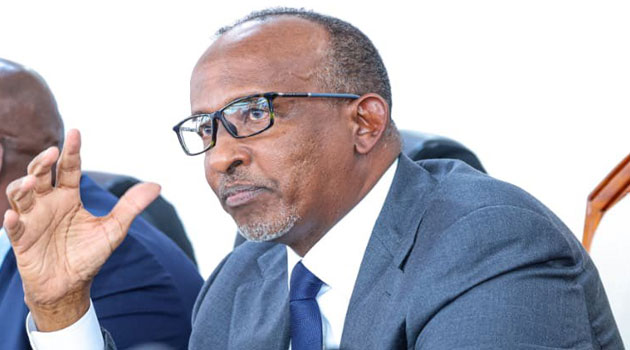
Duale tackles health cartels corruption in Kenya
NAIROBI, Kenya Aug 25 – Kenya’s health sector has been haunted by corruption for decades.
From billion-shilling procurement scandals at Afya House, to ghost hospitals and fake claims draining public coffers, billions meant to save lives have instead lined the pockets of cartels.
For ordinary Kenyans, the corruption is not just numbers, it’s empty medicine shelves, abandoned clinics, and patients dying because they cannot afford care.
Into the broken system has stepped Aden Duale, President William Ruto’s Health Cabinet Secretary.
Brash, outspoken, and determined to project himself as a no-nonsense reformer, Duale has declared war on what he calls “health cartels.”
But is he finally the man to fix Kenya’s rotten health sector or just another politician making noise while deeper problems fester?
Duale on Monday announced the absorption of 7,414 Universal Health Coverage (UHC) workers into permanent and pensionable terms by September 2025.
The move followed a nationwide verification exercise that exposed 215 ghost workers who had been drawing salaries without actually working.
“The Ministry of Health has concluded the Universal Health Coverage (UHC) staff verification exercise, with 7,414 staff set to be absorbed. We identified 215 individuals with irregularities, including ghost workers, whose salaries have been stopped pending investigations,” Duale declared.
Alongside the ghost worker purge, Duale has also gone after fraud in the new Social Health Authority (SHA), which is meant to drive President Ruto’s flagship TaifaCare program.
Duale claims his ministry has blocked Sh10.6 billion in fraudulent claims and shut down 728 questionable facilities.
“Our position on safeguarding public resources is unwavering. SHA has rejected Sh10.6 billion in fraudulent claims since TaifaCare’s rollout. We have closed 728 non-compliant facilities,” Duale told reporters.
But critics say the shutdowns are causing collateral damage.
Some of the closed facilities served rural communities where patients now have nowhere else to go.
Others argue that fraud thrives because the system itself is weak, not because small clinics are inherently criminal.
The Rural Private Hospitals Association of Kenya (RUPHA) fired a direct shot at Duale.
“How did a ‘hospital in a phone’ like Trenya get Sh10M from SHA? Where is the AI fraud detection CS Duale promised? Genuine providers are throttled while fraudsters profit. Fix it, @HonAdenDuale!”
While SHA CEO Mercy Mwangangi defended the agency, insisting that the funds went to legitimate facilities, the scandal has already fueled public anger.
– Hero or Villain? –
On the surface, Duale is taking the kind of bold action Kenyans have long demanded, rooting out ghost workers, blocking fake claims, and taking on powerful cartels.
Supporters argue that he is finally slaying the corruption monster that has crippled the sector for decades.
But critics see another story that of a politician eager to please his boss, President Ruto, with big announcements that play well in the media but do little to fix systemic failures.
They say Kenya’s health sector needs more than crackdowns, it needs real investment, stronger management, and reforms that prioritize patients over politics.
The stakes are high.
Every shilling lost to corruption is a bed not bought, a patient untreated, a life potentially lost.
If Duale is serious, his fight could mark a turning point in Kenya’s healthcare.
But if it’s just political theater, Kenyans will once again be left with empty promises and failing hospitals.
For now, the country watches.
Is Aden Duale the reformer Kenya’s health system has been waiting for or just another politician playing to the gallery while ordinary citizens continue to suffer?